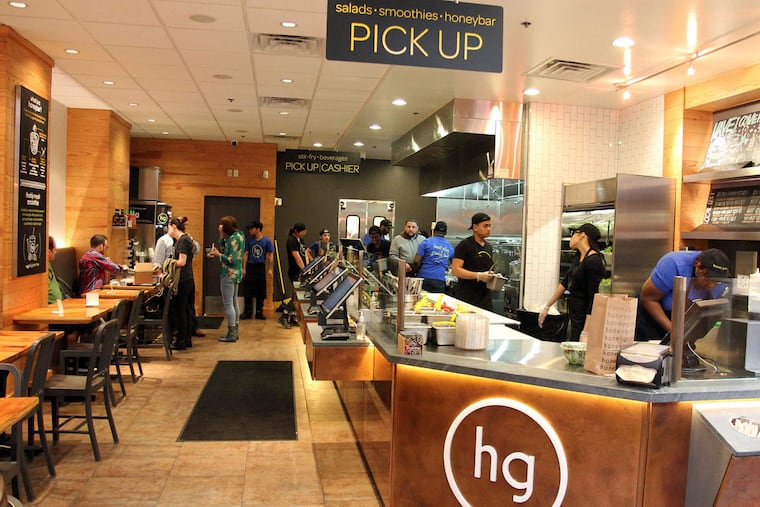New healthy food chains redefine fast food
Philadelphia's new and burgeoning genre of chain restaurants has less to do with burgers and fries than it does with quinoa (the protein-packed grain) and kale (the leafy vegetable once relegated to the bottom of deli trays).

Philadelphia's new and burgeoning genre of chain restaurants has less to do with burgers and fries than it does with quinoa (the protein-packed grain) and kale (the leafy vegetable once relegated to the bottom of deli trays).
Healthful eating is the theme of a segment of fast-casual restaurants, so defined by counter service and customization.
Credit a heightened awareness of nutrition combined with a soaring population of millennials and Generation Xers who seem to have a few bucks to spend. (Eating better does not necessarily equate to eating more cheaply; to do that, you must shop and cook for yourself.)
"This is the sexy, new growth category," said Deb Lutz, regional franchisee for b. good, a Boston-area healthy-food chain with three shops in the Philadelphia suburbs and a fourth on the way, and - like many of the start-ups - a penchant for lowercase brand names.
"People want to eat cleaner," said Lutz, adding that it's also driven by people looking for the clear nutrition labeling that all these restaurants provide.
It's also driven by the green approach - whether sourcing ingredients, decorating with reclaimed materials, or using biodegradable packaging.
People want more say in their food. A generation ago, one chain urged customers, "Have it your way." Nowadays, customers won't have it any other way.
Washington's sweetgreen was among the new green wave here, opening its first of three Philadelphia stores in spring 2014. It joined the established local Agno Grill, a Mediterranean concept, and Pure Fare, both under the same owners in Rittenhouse, and Animo Juice, which sells juices and customizable burritos and bowls in Haddonfield and Center City.
Newer players in this crowded field include honeygrow, a fast-rising, Philadelphia chain of stir-fry/salad/smoothie eateries; Bryn & Dane's, a Horsham multiunit whose menu is built on wraps, salads, and smoothies; freshii, a Toronto-rooted salad/wrap/burrito spot now in University City; Robeks, a Los Angeles juice/smoothie/bowl franchise in Ardmore and Center City; and the local Wokworks, an Asian quick-serve; Herban Quality Eats, a cafe founded by a chef and two Wharton School graduates that serves salads and platters; Crisp Kitchen, a salad/stir-fry shop at Temple University; and Farmer's Keep, an independent Center City salad specialist.
This summer, a branch of Beefsteak, a vegetable-focused fast-casual from chef José Andrés, is due to open at the University of Pennsylvania.
Also in the fresh fray is Snap Kitchen, an Austin, Texas, company that opened a massive commissary in Philadelphia this year to create refrigerated meals sold at what soon will be seven convenience stores in the region. Though Snap Kitchen locations have a few seats and a microwave oven, they are intended as grocery stores.
In addition, a subcategory of the subcategory is growing: vegan (though noncustomizable) offerings from P.S. & Co. in Rittenhouse and HipCityVeg in Rittenhouse and University City.
Of course, the granddaddy of the category is Saladworks, which started in 1986 in Cherry Hill, founded on entree-size salads, if not necessarily healthful ones. Saladworks has recently begun rolling out a "refreshed" prototype, adding the requisite baby kale, quinoa and roasted Brussels sprouts to its selections.
To a one, the restaurateurs said they opened because of need. "The lack of healthy, fast, affordable food was terrible, and I was tired of buying a $7 salad from a pizza store," said Joshua Bullock, who opened Farmer's Keep last fall on 20th Street near Market. The restaurant offers build-your-own plates, sold by the pound, and everything is gluten-free, dairy-free, egg-free, nut-free, and shellfish-free.
Snap Kitchen cofounder Martin Berson said his wife has type 1 diabetes, and b. good's Lutz wanted to satisfy the nutritional requirements of her daughter, who has Prader-Willi syndrome and needs to eat efficiently.
The demographics are promising. After three months at 36th and Market Streets, Herban Quality Eats cofounder Amir Fardshisheh, who created the brand with fellow Wharton School graduate Kalefe Wright and chef Chris Paul, said they didn't serve just students. "It's everyone, ages 20 to 70, male and female, doctors, nurses, police officers . . . and a good amount of West Philly locals."
Yet Darren Tristano, president of the food analytics company Technomic, seemed to view the sector with caution. Although collectively the restaurants grew sales at a rate of 22.5 percent last year, he said in an email that "the health-focused concepts are rolling out faster than the consumer demand is increasing."
Also a factor is the price. Though Lutz insists customers will pay more for quality, Tristano said: "They are a bit steep for most American consumers, so the shift to [healthful quick-service dining] will likely be slow and consistent."
Traditional restaurateurs are seeing the value in the healthy quick-service sector, a subset of the booming category of fast-casual. Danny Meyer, Daniel Boulud, and David Chang have all invested in sweetgreen.
"Every professional investor wants to get involved" in the fast-casual sector, said David Robkin, president of honeygrow and one of its chief investors. Honeygrow has seven stores and plans to open nine more by the end of the year.
Robkin said operators in the fast-casual sector, which includes Shake Shack and Panera, were seeing returns on investment of 30 percent to 40 percent.
Now that's healthy.